How to get your bond back
Getting a full bond refund at the end of your tenancy is important, and not just for your bank balance. Follow the Man's guide on getting your bond returned and avoid the headache of a permanent mark on your rental history.
What is a bond payment?
A rental bond is made by tenants once you’ve signed a lease on a property. It’s a type of security deposit for a landlord, useful in the scenario when a lease agreement has been breached.
Think of it as a mutually agreed style of insurance, in the case that your property is damaged in a way that will be costly to repair. For your bond to be held once you’ve moved out, the fault will need to be your own for your own.
Getting your bond back once you’ve moved out will stop your bond retention from appearing on future tenancy applications, affecting the likelihood of you being approved for other properties.
Find out more about bond claims and refunds here.
What's the likelihood of losing my bond?
Typically, it's the more inexperienced, younger renters that are at risk of losing their bond payment. One study conducted by Finder concluded that one in three Australian tenets lose their bond either partially or completely.
Preventing your bond from being retained
The single best way of getting your bond back is to prevent your real estate organisation from needing it once you’ve moved out.
Nip the problem in the bud before it eventuates, and spend your tenancy thanking the earlier version of yourself.
Read your lease agreement - thoroughly
Read it front to back. Seriously.
Your real estate agency can highlight the unique conditions of being a tenant - in some properties, you’ll be required to look after all garden maintenance. Others, you’ll be required not to use the fireplace in case fire smoke affects the wall paint.
Knowing exactly what you’ve agreed to is a total no-brainer - allocate 20 minutes out of your day to read your agreement, and don't be intimidated to ask questions on anything that you might find unreasonable.

Double-check your initial condition report
Let's start things off with the truly crucial part - when you move into a rental, you’ll be asked to fill in a condition report. This can often seem like a pain when you want to get your boxes unpacked and get settled into your new spot, however, it’s worth being as detailed as possible at this point — you'll thank your younger self when the move-out day comes around.
Once you’ve received your condition report, inspect it thoroughly before signing your lease. Make sure that any damage to your property is reported on, and avoid a missing item making its way to your long term rental record. Check all surfaces, walls, paintwork, appliances and furnishings for signs of wear and tear. As you’ve taken a bunch of pictures and logged all pre-existing issues, you’ll be safe at the end of your tenancy from any accusations of damage (except those things you’re responsible for).
Keep in mind that during moving day, this will be the most likely period where damage will occur when moving furniture in. Keep an eye out and keep your place looking perfect!
Once you’re In
Issues will inevitably pop up - that's all a part of the renting experience. Fun fun!
What you do about them is what counts - and that's not just the Man breaking out some rental wisdom here. Fixing repairs when they arise or involving the landlord to fix them will increase the likelihood of getting your bond back - and leaving it to the last minute when you’re moving out will certainly reduce your odds.
Always, always, always pay your rent
There are very few circumstances where not paying your rent can help your case. A happy landlord sees rent when expected - if it makes things easier, ask if you can set a particular day of the month, and set up a recurring payment in your bank account so you don’t even have to think about it. Unless you overspend on all the smashed avocado and flat whites throughout the month (yes, we would all like to, but prioritising your rent will keep the roof over your head).
Cleaning when moving out
The place has to look as good - if not, better - than the day you moved in. Good thing you took all those photos in the first place right?
To make things easier, delegate the different tasks if you have roommates that are willing to help and get it done much quicker. Seen as you’re all on the bond, tackling the house as a group can be a great way of avoiding potential conflicts when moving out.
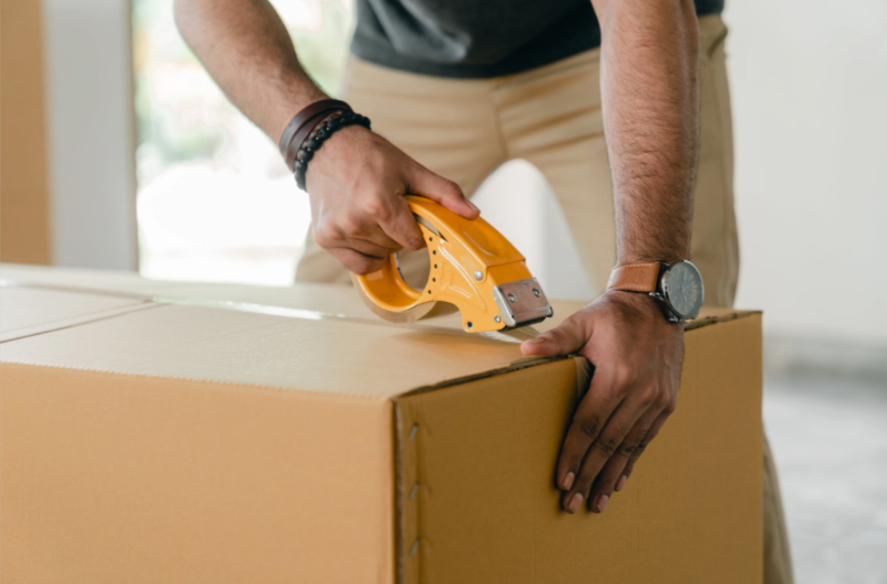
Clean the oven
This one is a bit out of sight, out of mind — close the oven door, and no one can see the remains of last February’s nacho night hard-baked all over the internal walls.
This is not one you can fool your landlord or property manager with, though, as they'll have seen their fair share of filthy ovens over the years, and they'll make a bee-line for it at the inspection. Putting a bit of work into this oft-neglected task may just help them to see you’ve been doing your bit to keep the place in good order.
Mow the lawns and tidy up the garden
A bit of a no-brainer — nothing sets a property manager on edge more than a tenant who’s allowed the front lawn to get to armpit height. This is the first thing they’ll notice when they come to the inspection, so don’t spoil their mood before they even get into the house. Grab the mower, put on the garden gloves, and neaten it up. You don’t have to go too overboard, just make sure that it’s not the least tended-to garden on the street.
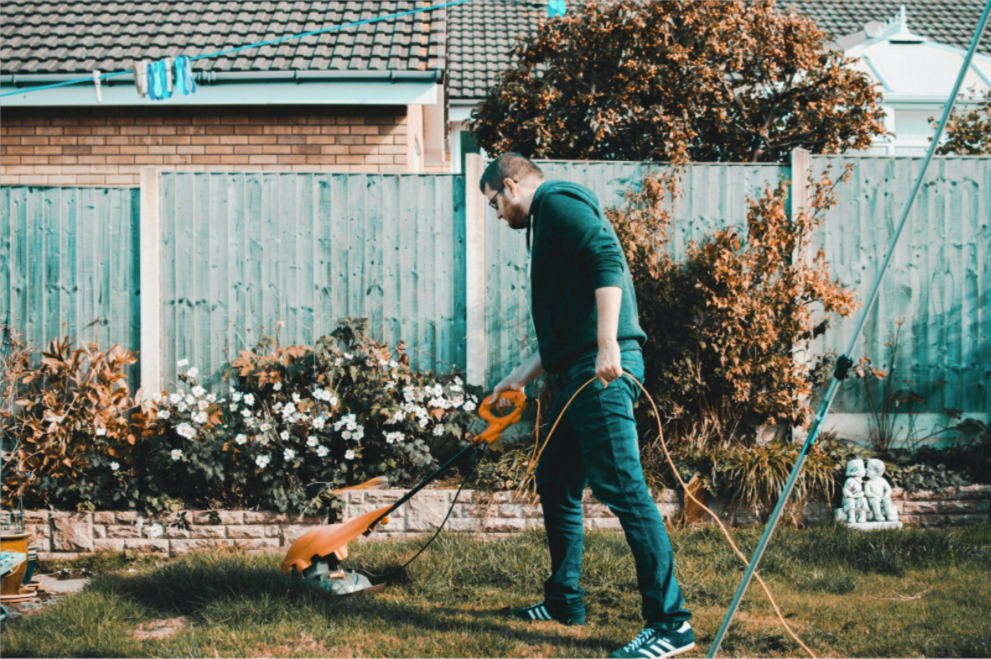
Scrub the walls
This is everyone’s least favourite, so we’re calling it optional.
If the walls are largely pristine, you can get away without too much elbow grease. If you’ve been leaning things against the walls, holding house parties, or it’s been a long time since you gave the place a once-over, you’re going to need to apply some elbow grease. Use sugar soap or a similar product (even a diluted ‘spray and wipe’) to get rid of dark grime-y patches.
You’ll be amazed when you step back to take a look at how much of a difference a bit of scrubbing can make to a room.
Mop and Vacuum throughout the house
This is an easy win — get the floors looking sparkly clean, and you’ll be well on your way to impressing the property manager at inspection time.
Vacuum carpeted floors thoroughly, and mop and sweep hardwood floors. Of course, you already do this every week or two though, right?
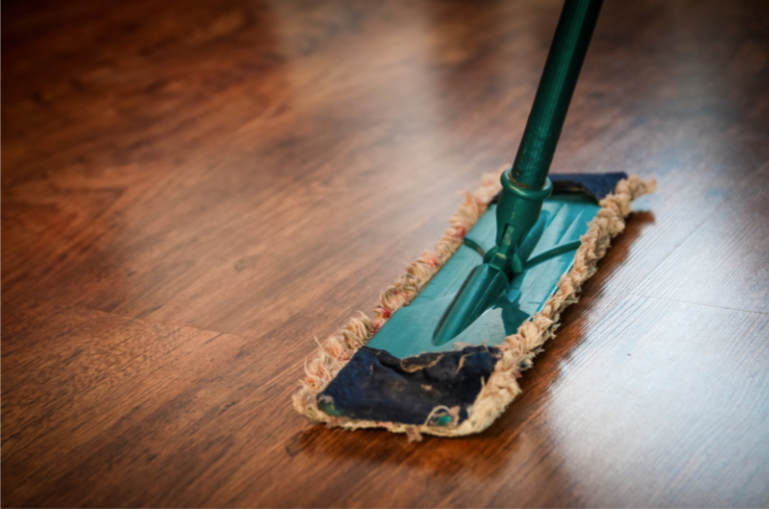
Fill any screw or nail holes and touch-up with paint
If you’ve been hanging paintings or other wall decorations and made modifications to do so (i.e. drilled or nailed into the walls) you’ll want to make sure that you fill and paint these before your final inspection.
These are a ‘gimme’ for a disgruntled property manager and/or landlord — remember, you’re wanting to make it as simple as possible for them to tick you off for a full refund. Get down to your local hardware store and grab some putty and a small tin of white/off-white paint to touch up with — a small investment of time and money here could save you a lot further down the line.
While some things may be a bit beyond your ability to fix (those big scratches you made in the floorboards pulling your wardrobe around, for example) there are many things you can do to help make a better impression when your property manager makes the final inspection. You’re trying to create an overall appearance of cleanliness, to add to the idea that you’ve been looking after the place — which you have been, no?
Worst case scenario
You’ve given yourself the time to prepare the property to hand the keys over, but there are one or more things that you just couldn’t fix yourself. You’re not alone - this happens to one in three renters in their lifetime.
Don’t procrastinate about it - get the professionals involved. Get a few quotes from carpet cleaners, painters, handymen or plumbers, depending on the damage caused. It’ll leave you footing the bill, but compared with the black mark on your record of a retained bond, it's worth it.
Keep your receipts!
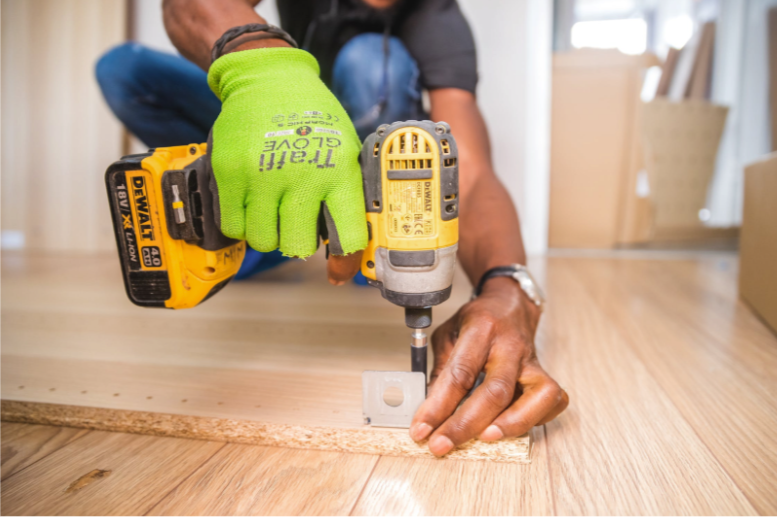
Find a few of the Man's mates we recommend calling in case you need professional assistance.
The outgoing inspection
Drumroll, please.
This is where you are most likely to have your landlord retain your bond.
It’s worth noting that normal wear and tear is perfectly acceptable - the property will show signs of life over its lifetime, and you’re only human. Landlords can’t expect you to be wrapped in bubble wrap during your tenancy. Think curtains or carpets that have faded, thin structural cracks in the walls, or flakey paint.
Unfortunately, the same doesn't apply for a garden that looks like it’s a jungle, red wine stains on a white carpet, burn marks or that hole in the wall you’ve been meaning to patch up.
Be proactive about it
There's no reason to wait around for your bond to be handled correctly for you - keep a (metaphorical) eye on it at all times. If you disagree with a decision made about keeping your bond, make a claim with the RBTA and see what options you have.
Find more information about common problems found with bonds here.
Thinking about disputing your bond?
If you’ve had your bond retained and you need it back, you have two options available to you. Either you can:
- Negotiate with the landlord to have it returned
- Have the matter escalated and taken to VCAT
In the case you got to VCAT, you’ll need all the evidence on file - think photos of any damage done, financial transactions, and anything you may think is handy.
Take a walk around your property and take note of what you think your landlord can prove against your claim. But the lucky part is that if you’ve done nothing wrong (but of course?), there is nothing to worry about - just a few extra steps.
Find more on how to view, arrange, or transfer your bond here.
To wrap it up
Your bond payment is an important part of your renting experience - getting it back is even more important. If you think there’s some damage that will cost you, there’s a solution far more frequently than you’d think.
More of
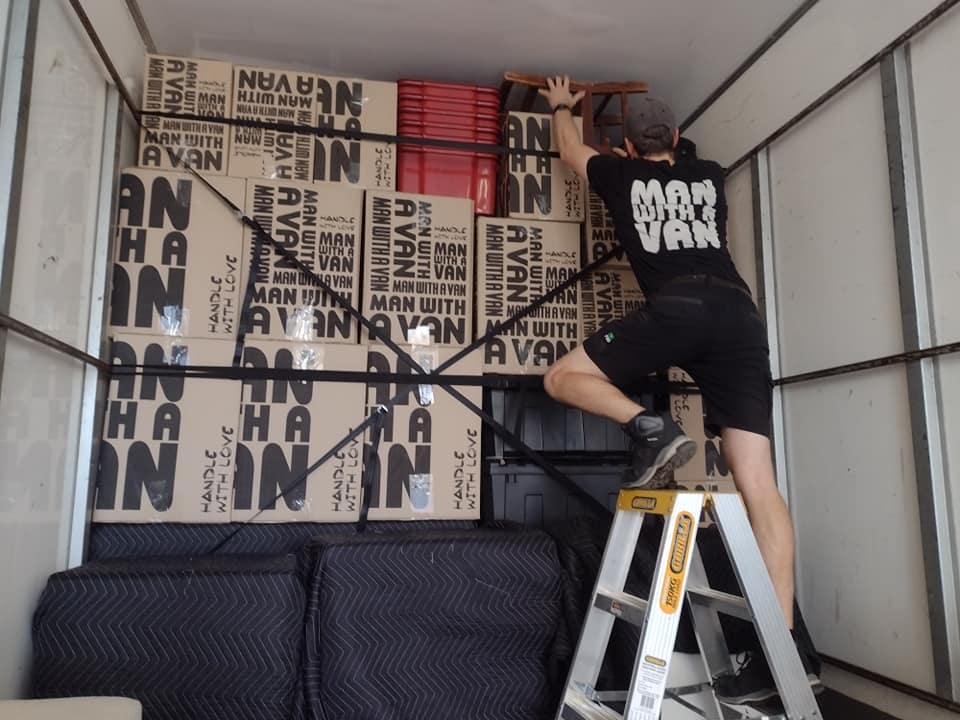
Moving House Tips & Hacks
Make moving house easy with expert tips & hacks from Man With A Van. Save time, reduce stress, and streamline your move with our practical advice.
Read more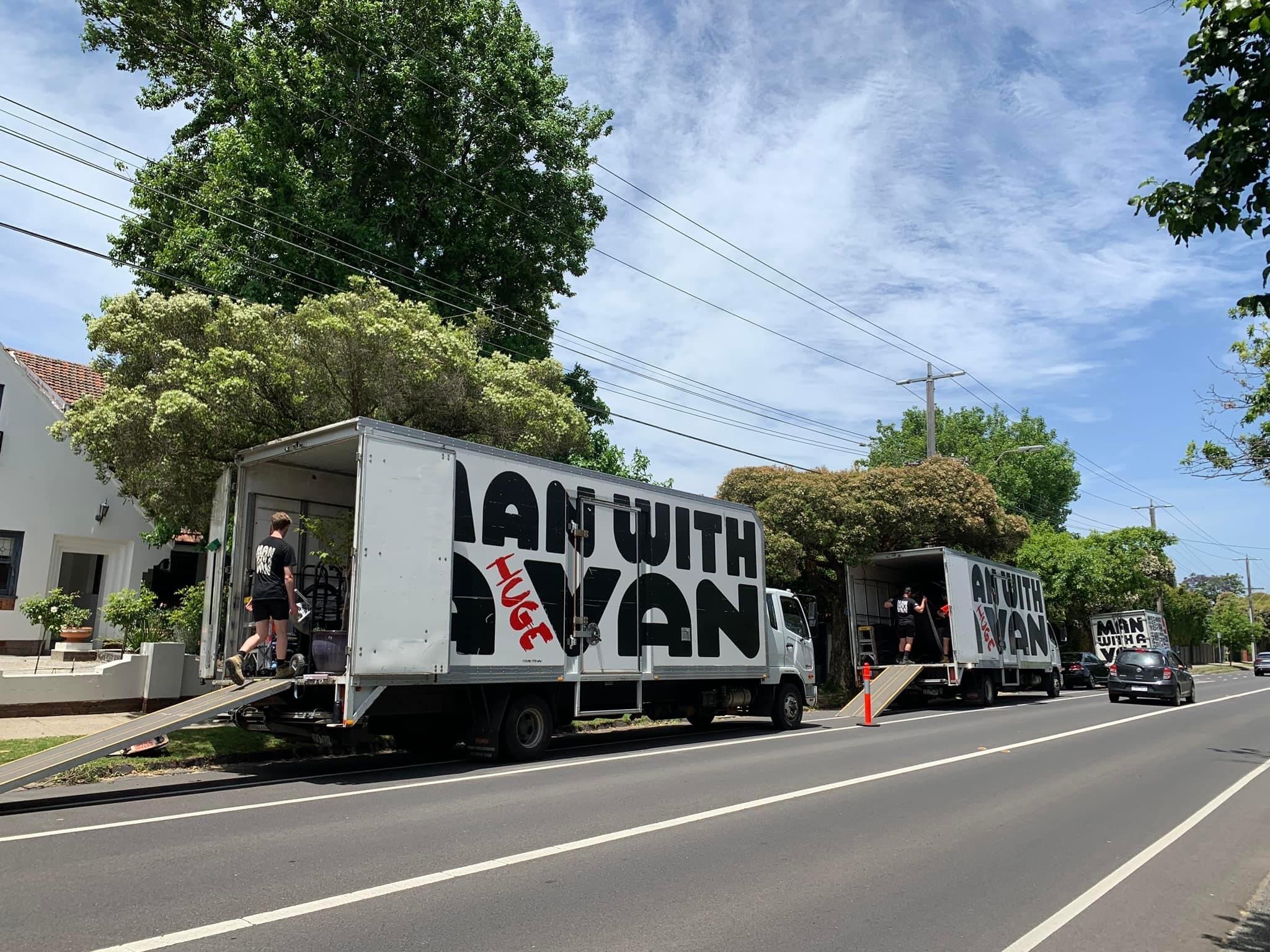
How Much Does it Cost to Move a House in Melbourne
Curious about house moving costs in Melbourne? Discover the factors that affect pricing and get a breakdown of typical expenses for relocating your home.
Read more
How to Move a Fridge: A Comprehensive Guide
Moving a fridge is a tricky business. Save damaging your fridge, and your back - learn the best tips and tricks with our comprehensive guide.
Read more